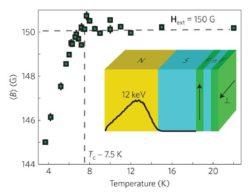Superconducting Spintronics
The dissipation of heat in traditional silicon (CMOS) based electronics is a major source of inefficiency and environmental impact. Superconductors are, by nature, dissipationless. Computing via logic circuits based on Josephson junctions is also faster, but the largest remaining problem is the lagging development of low-temperature memory. To achieve the promised efficiency increases of these computers requires a new type of low-temperature memory architecture.

Using advanced low energy muon spectroscopy, we have demonstrated a remotely controlled superconducting state.
Traditionally considered competing phenomena, when artificially juxtaposed a wealth of physics at the interface between superconductors and ferromagnets emerges. Spin-polarised Cooper pairs are capable of surviving inside a ferromagnet over much longer distances than the regular (spin-singlet, anti-parallel) pairs. This new type of Cooper pair is the building block for super-spintronics; leading to a dissipationless spin-current combined with spintronic devices.
We are investigating the interaction of superconductivity with artificial magnetic structures, developing a new breed of hybrid superconducting-magnetic devices in which the devices are actively controllable through the magnetic or electron-spin configuration. This represents a convergence of superconductivity and spintronics and so depends upon, and contribute to current spintronics research.
- SUPERSPIN: Superconducting Spintronics for Highly Energery Efficient Cryogenic Memory Applications Dr Gavin Burnell, Dr Nathan Satchell (sponsor ERC, A Merie Curie Outgoing Global Fellowship. 2017-2020)
- Imaging and Control of Novel Coherent Electronic States in Artificial Ferromagnetic-Superconducting Hybrid Metamaterials and Devices, Dr Gavin Burnell and Prof. Chris Marrows (sponsor EPSRC, total value £3.7M of which £1.035M to Leeds, collaborating partners, Universities of St Andrews, Bath, Royal Holloway Colelge (London) and the STFC ISIS Neutron Source, 2012-2016)
- Andreev Reflection in Superconducting Spin Polarised Devices. An Advanced Research Fellowship awarded to Dr Gavin Burnell with associated research grant (sponsor: EPSRC, £562k, 2006-2011)
- SFINX Ferromagnet/superconductor hybrids STREP (Prof Cris Marrows, sponsor: EU through Framework 6, 2004-2007, €2112k total)
